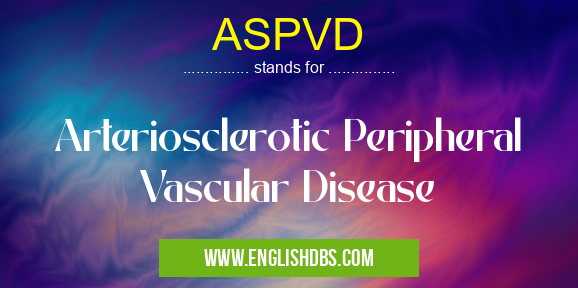What does ASPVD mean in PHYSIOLOGY
Arteriosclerotic Peripheral Vascular Disease (ASPVD) is a progressive condition that affects the blood vessels in the body, leading to narrowing and hardening of the arteries. This narrowing increases the risk of circulation problems and other health complications.

ASPVD meaning in Physiology in Medical
ASPVD mostly used in an acronym Physiology in Category Medical that means Arteriosclerotic Peripheral Vascular Disease
Shorthand: ASPVD,
Full Form: Arteriosclerotic Peripheral Vascular Disease
For more information of "Arteriosclerotic Peripheral Vascular Disease", see the section below.
» Medical » Physiology
Essential Questions and Answers on Arteriosclerotic Peripheral Vascular Disease in "MEDICAL»PHYSIOLOGY"
What causes ASPVD?
The exact cause of ASPVD is unknown but risk factors for developing this condition include age, smoking, high blood pressure, diabetes, high cholesterol levels, and family history.
What are some common symptoms of ASPVD?
Symptoms of ASPVD can vary depending on which areas of the body are affected. Common signs and symptoms include pain or tiredness in the legs when walking, changes in skin color (pale or bluish), coldness in certain areas of the body due to decreased circulation, ulcers on feet or toes, slow-healing wounds, and stroke-like symptoms such as slurred speech.
How is ASPVD diagnosed?
A doctor may use imaging tests like an ultrasound or MRI to diagnose ASPVD. The doctor may also do a physical exam to look for impaired pulses in your arms or legs. They may also order lab tests to check your cholesterol levels and other indicators of poor circulation.
Is there any treatment available for ASPVD?
Yes — there are several treatments available for managing ASPVD. These include lifestyle modifications like quitting smoking and losing weight; medications such as antiplatelets and statins; revascularization procedures like angioplasty; and lifestyle therapies such as exercise programs designed to improve circulation in affected areas of the body.
Are there any complications associated with ASPVD?
Possible complications associated with untreated or poorly managed cases of ASPVD include heart attack, stroke, gangrene, limb loss, peripheral arterial disease (PAD), aortic aneurysm rupture, abdominal aneurysm rupture and deep vein thrombosis (DVT).
Final Words:
Arteriosclerotic Peripheral Vascular Disease is a serious health condition that can lead to life-threatening complications if left untreated. It is important for anyone with symptoms related to this disease to see their healthcare provider right away so they can receive proper diagnosis and treatment as soon as possible.
